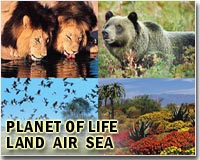 |
Nairobi (AFP) Feb 24, 2011 Growing environmental awareness over the past two decades has resulted in the adoption of a plethora of some 500 conventions, which paradoxically has hindered saving the planet, experts said Thursday. The 100 or so environment ministers gathered this week in Nairobi under the auspices of the UN environment agency were unanimous in recognising the need for an in-depth reform of a system that has become a victim of its own success. "Never in the last four to five years has the governing council been as clear in its assessment for the need for reform," UNEP Executive Director Achim Steiner told AFP Thursday On Thursday the ministers called for the question to be studied and if possible decided on at the next UN summit on sustainable development planned for June 2012 in Rio de Janeiro. "Notwithstanding the impressive landscape of institutions, agreements and protocols, the environmental governance landscape of the here and now is increasingly fractured and fragmented," Steiner told the meeting. A diplomat specialising in environmental issues put it even more bluntly: "There is no pilot in the plane." UNEP is a long way behind the World Trade Organisation or the World Health Organisation. With a 2010 budget of 83 million dollars, it is one of only two UN agencies to be headquartered in Africa. Only 58 states, out of a total of 193 in the world, are members. The agency has very little control over the international conventions that are springing up. Steiner mentioned that there were more than 500 such conventions but no one seemed able to give an exact figure. The majority have been adopted since the 1992 earth summit in Rio. Today they form a thick mesh of laws that remain confusing even to specialists. Each convention has its own secretariat, which scarcely communicates with the others. "For the regulation of chemical products alone there are three major conventions. It took five years of talks not to merge them but simply to bring them under a common umbrella," sighed one specialist involved in the talks. Between 1992 and 2007, 540 meetings have been called under 18 international treaties, generating more than 5000 decisions. Developing countries are starting to feel overwhelmed. The various conventions are anything but equal: the convention on climate change, adopted in 1992, easily collected some 100 billion dollars for its budget. The Convention to Combat Desertification, adopted two years later, is struggling to garner a tiny fraction of that amount. "It's the poor countries' convention. Nobody cares," a diplomat said. But beyond the facade of everything being unanimous, talks on how to harmonise the system have been deadlocked for years. With the backing of their European Union partners, France and Germany have once again lobbied for the setting up of a "world environment organisation." "We want to reinforce UNEP and change it to make it into a global instrument," French Ecology Minister Nathalie Kosciusko-Morizet said. Countries that are reticent, be it for political or budgetary reasons, include the United States, China, Russia and India. "We have all agreed that UNEP needs to be reinforced. We have also decided to continue with our talks to see exactly how we're going to achieve that," said Spain's Environment Minister Rosa Aguilar Rivero, who also chairs UNEP's council of governors.
Share This Article With Planet Earth
Related Links Darwin Today At TerraDaily.com
 On the hop: Fence tactic thwarts toxic toad
On the hop: Fence tactic thwarts toxic toadParis (AFP) Feb 23, 2011 For three-quarters of a century, the cane toad has rampaged around northeastern Australia, but scientists hope the toxic terror may at last be stopped in its tracks. A native of Central America, the cane toad (Bufo marinus) was introduced to Australia in 1935 to kill beetles devastating sugar-cane crops, only to become a pest in its own right. But a new investigation says that the toad - ... read more |
|
| The content herein, unless otherwise known to be public domain, are Copyright 1995-2010 - SpaceDaily. AFP and UPI Wire Stories are copyright Agence France-Presse and United Press International. ESA Portal Reports are copyright European Space Agency. All NASA sourced material is public domain. Additional copyrights may apply in whole or part to other bona fide parties. Advertising does not imply endorsement,agreement or approval of any opinions, statements or information provided by SpaceDaily on any Web page published or hosted by SpaceDaily. Privacy Statement |